The Power Of Relays & Race Craft In Great Britain Quest Of Quartets

Great Britain swimmers approach the start of eight days of racing at the World Aquatics Championships in Doha this Sunday with a plethora of purposes and missions pertinent to them and their Paris 2024 ambitions but one of their goals in relays stands out as a power-of-now occasion: there’s a ticket to the Olympic 4x100m freestyle up for grabs.
Olympic and World 4x200m champions Tom Dean, Duncan Scott and Matt Richards are leading the charge to add yet another relay medal shot to prospects of building the next wave of historic progress for Britain in the pool three years after Tokyo delivered the best-ever result for the national swimming team.
Jacob Whittle and Joe Litchfield are in Doha and among those, along with the other member of Great Britain golden 4x200m relays James Guy and 50-100m sprinter Lewis Burras (Guy is bypassing the intercalated championships this week, as is Burras, who will race this weekend at the Lisbon International), who will be in the hunt for a Paris sprint-foursome+reserve slot at April Olympic trials in a nation where a furious battle for the two national-team 200m solo berths begat relay passion begat a “no-limits” quest for international honours.
As Dean put it when I spoke to him earlier this northern winter:
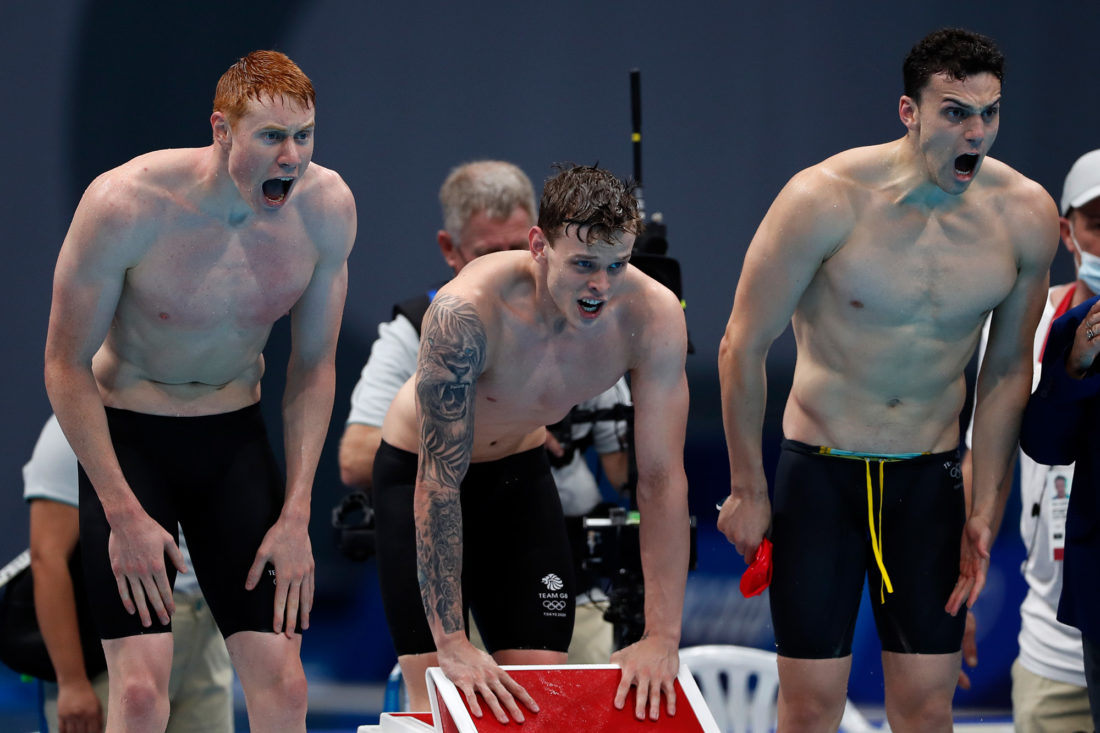
“All of a sudden, we’re knocking on the door of a medal or better still knocking on the door of winning, which is incredible.
The 4x100m is starting to follow a bit of the same path as the 4x200m, which was brewing and bubbling under the surface before we then burst onto the scene.”
Tom Dean. Photo: (l-r) Tom Dean, Matt Richards and James Guy yell Duncan Scott home – by Simone Castrovillari, courtesy of Speedo
Victories in the 4x200m, the first for Britain since 1908, and the inaugural mixed medley event contributed to a third-place finish behind the USA and Australia on the medals table in Tokyo with four gold atop eight medals.
Between them, the 4x200m Olympic champions Tom Dean, James Guy, Matt Richards and Duncan Scott have fished a collective 64 relay medals in the 50m pool from Olympic, World and European waters for Great Britain between 2015 and 2023.
That pantheon highlights the empty shelf. Since the sprint relay was introduced as an Olympic event in 1964, Britain’s best remains a fourth place in 1968. Beijing 2008 marks the last time Britain made the Olympic final, for last, eighth place.
Then in 2022, the slow brew looked set to boil when three teenagers Burras, Whittle and Richards, with Olympic 200m freestyle champion Dean axed two seconds off the national record to finishing fourth place at the World Championships in Budapest, their 3mins 11.14sec leaving them just 0.19sec shy of the medals, Dean joining the elite club of sub-47sec men with a 46.95 split.
The next level was in the grasp of Great Britain just six months ago, when the same three teenagers and Scott, the Olympic 200m freestyle and medley medallist and holder of the fastest textile-suit 100m free split in history (got GBR gold in the 4x100m medley at Gwangju 2019 Worlds in an historic win over the USA), cracked the British record in 3:10.47 to lead qualifying heats in Fukuoka, Japan, only to find themselves demoted to the bottom of the scoreboard with a “DQ” next to their names. Whittle, the 6ft 4 sprinter who made his Olympic debut aged 16 in Tokyo and will still be 19 should he qualify for Paris, had left his blocks 0.04sec too soon.
An opportunity opened up and was factored into the Great Britain planning led by head coach Bill Furniss and performance director Chris Spice, who said: “We are all aware of the unusual challenge that a World Championships in Olympic year could pose – but our swimmers and staff are preparing for Doha as a crucial part of our build-up to Paris and, before that, the British Swimming Championships in April.
“Locking in relay places across the Olympic programme is a key focus, with our relay teams having been so successful in recent years, showing the versatility and depth of this cohort of athletes. On top of that, though, this is a great racing opportunity on the world stage and will be a serious test of our swimmers’ preparations and work over the winter months as they will still be in heavy training throughout the meet.”
Doha 2024 entries/start lists/results at Omega
In Fukuoka, even with 0.04sec added on, young Whittle’s split time of 47.37 would end up being the fourth fastest of all relay swimmers after a final won by Australia in 3:10.16. Britain’s heats time would have matched Italy’s silver-medal performance in the final, while its swiftest quartet may well have challenged Australia for gold.
“It was pretty disappointing,” says Scott. “But these lessons are golden in sport and if you embrace them … only better things lie ahead.”
Richards agrees, adding with a nod to Doha and, all being well, Paris beyond:
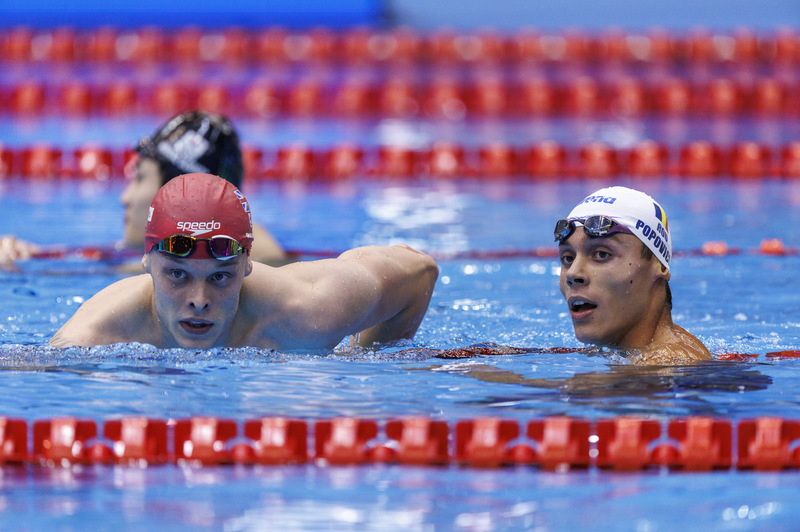
“It’s kind of been an event that’s been brewing in the background for the last few years. I mean, I think the circle of British teammates involved in that [4×100] team know and have known for a while that we’ve got a real opportunity on our hands. But … we’ve not yet put it together.
“We’ve never even won a medal in the 4×100, so it’s one of those that we know we’ve got the opportunity to go there and even win it even though we’ve never stepped foot on the podium as a team before. That is really exciting. I mean, we’re kind of going in as underdogs, where on that, whereas on the 4×2, you’d expect us to be going in as favourites for that.”
Matt Richards. Photo: Matt Richards, left, and David Popovici (Photo by Patrick B. Kraemer / MAGICPBK)
The Call Of “All You Have To Do”
The power of relays is no mystery: look no further to the United States to find a prime example of a key pillar holding up many houses under one roof generation after generation, wave after wave. It was something team director Lindsay Mintenko (nee Benko) invited the men’s medley team to bring mind, heart and soul back to when the USA made the final of the 4x100m medley final in an outside lane at Tokyo 2020 at the end of a week in which the 4x200m squad had missed the medals for the first time and the 4×100 mixed medley squad got a drubbing, too.
Mintenko sketched it out on the back of proverbial fag pocket for the big blokes at risk of doubting the Stars and Stripes earned by generations before them: she simply added up their best times and noted that it was “all you have to do”. Can you feel the hairs standing up on the back of of the necks of the highly capable-when-engaged?
When the USA touched just ahead of Britain in Covid-delayed Tokyo two years after the Gwangju 2019 wake-up call, the big screen flashed the moment when Caeleb Dressel gave us a glimpse of the warrior spirit in the champion heart: after an instant roar and leap for joy, his gaze tilted and turned, eyes fixed on the Brits in the middle lane, jaw tensed to square, the nod a deliberate ‘take that – our day, our gold, our’s to own’.
But not forever if others master the art, too. A battle won, the war in sport never done, silver a fine fuel for those who engage it that way. Britain has mastered the art. There are no guarantees but as the USA demonstrates, its a lot easier too return to a grounding of comprehension when you’ve lived the lesson and got it!
The recent team-wide challenge to the USA brought by Australia only serves to highlight the awesome in the force of foursome, relays a key part of the punch of boxing kangaroos in dolphin clothing. It’s about team building and bonding, shared mission, common goal, sense of belonging; it’s life lessons in the art of ‘all for one, one for all’; it’s the alchemy of ‘burden’ and ‘sacrifice’ to purpose and personal growth; it’s pride without prejudice.
And it’s the greatest showcase of swimming as a team sport, not just a sum of individuals who happen to be wearing the same kit and cap. Here’s a good slug of wisdom from Dean, Scott and Richards had to say about that when we chatted through their sponsor Speedo over winter (and down the line, much more to come on those interviews):
The Power of Relays & ‘Team’
Scott, with James Guy a powerhouse of podiums for Britain in relays, sums up the feelings of his teammates when he notes: “I don’t know there’s ever been a time when we’ve had stronger relays in Britain. So I think that’s really special in itself.”
The ripple effect is obvious, says Dean: “… everyone wants a bit of it; every lad in the UK and on the British team just wants to feel they have a shot at making the 4×200, and you go to trials and it’s [the final] as quick as the world championships. I think the 4×100 is following the same pattern and the standard just to get into the team is really strong.”
He highlights a particular aspect of the 4x100m that can have significant impact on team-wide performances on the big occasion. The sprint freestyle relay falls on the opening day of racing in Doha and at the Olympic Games in Paris on July 27. Says Dean:
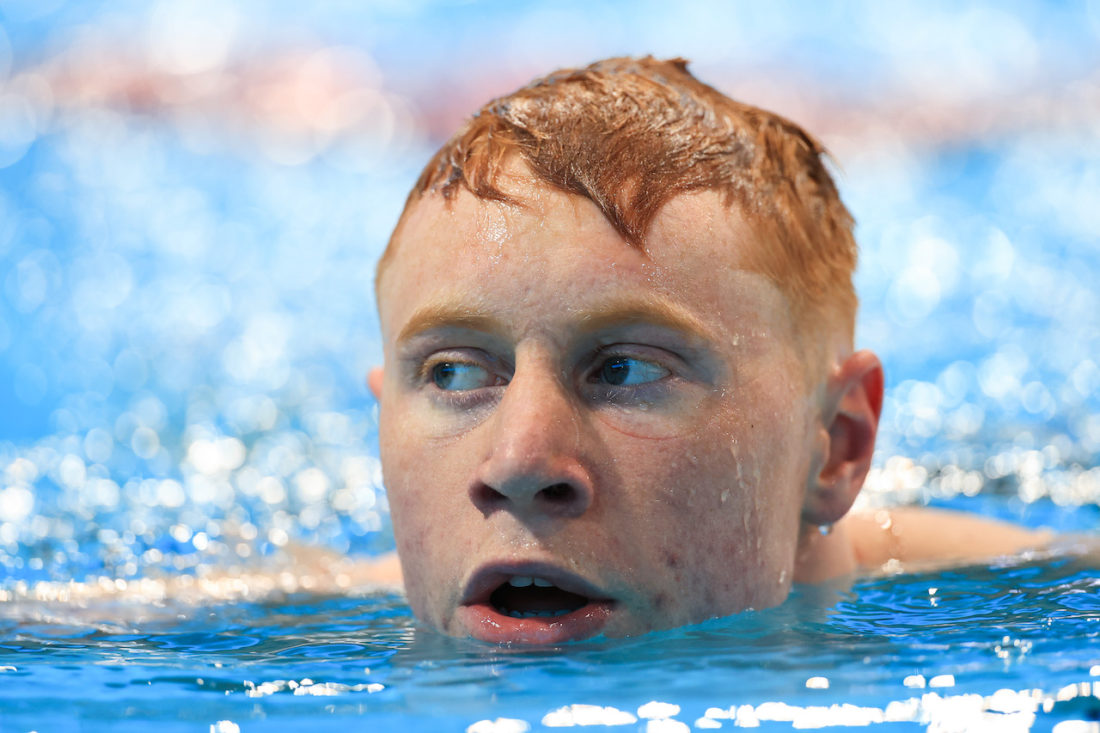
“Once we start getting a few medals on the table, as we know from the 4×200 and having four lads with a gold medal round their neck, all of a the sudden it lifts the whole team. We’ve woken up in Britain to the fact that we need relays to do. We’re really strong at relays.
They’re a big chance to get some silverware… to take home with us. And that’s why they’re doing things like a relay camps. That’s where they [performance team] put more of an emphasis on it and [organise] altitude camps where all the relay lads come together to work together.”
Tom Dean – Photo: Olympic Selection Trials in 2021 – en route to two Olympic golds – courtesy of British Swimming
Scott, Devourer & Student Of Team Sports

A team player in a sport often seen as ‘individual’ in nature, Scott is a fan and student of the Six Nations, NFL and other team sports and what they can teach any athlete/coach/manager.
In the bleak mid-winter, Scott spends a decent amount of time recovering between sessions watching the NFL playoffs “for hours”. He says:
“Growing up, I was a big fan of team sports. Something I always really enjoyed. Going to a boarding school, it was … mandatory, I think, to have to do team sports and something I loved doing. Among sports I love watching the most, the Six Nations is actually something that I love watching as well, but one of the things I really liked about NFL is that they play no matter what. So it was -28 the other day and they played… which is kind of mad. I’m a big fan of team sports and the way that different teams operate, the way that coaches can get people together or get teams to do different things.”
Asked if there was anything specific aspect of team sports that stood out as helpful in pursuit of his own ambitions in the pool for Britain, Scott pointed to Tom Brady and noted how since retired the former NFL star has “opened up more and more around what he was like” as a player.
“I think that’s really special because, you know, he’s someone that wasn’t particularly talented or gifted in a physical sense. His work ethic and things like that are quite inspiring. That kind of alludes to the fact that there’s always other stories that [can turn to] about world-class athletes going the extra mile or how they focussed on the finer details…” All of which is encouraging and instructive “if I’m wanting to look back on races and analyse a little bit further.”
Race Craft & The Mastery Of The Few Minutes That Represent Years Of Intricate Effort
Some years ago, at the height of the composer’s genius while working on the Phelpsian Symphony in G Major [some favourites in G Major: most pertinent to the 23 – Haydn – Symphony No 23 in G Major – Christopher Hogwood The Academy of Ancient Music + Bach – Cello Suite No. 1 in G Major, Prélude – Yo-Yo Ma + Mozart – Symphony No. 12 KV 110 / Folkwang Kammerorchester – Johannes Klumpp + Mozart – Symphony Nr. 10 G-Dur KV 74, hr-Sinfonieorchester, Fabio Biondi], I asked Bob Bowman what purpose it served for his charge to turn up for a series of in-season races in which he would finish a fair slog down in best times (for obvious reasons). There was, said the coach:
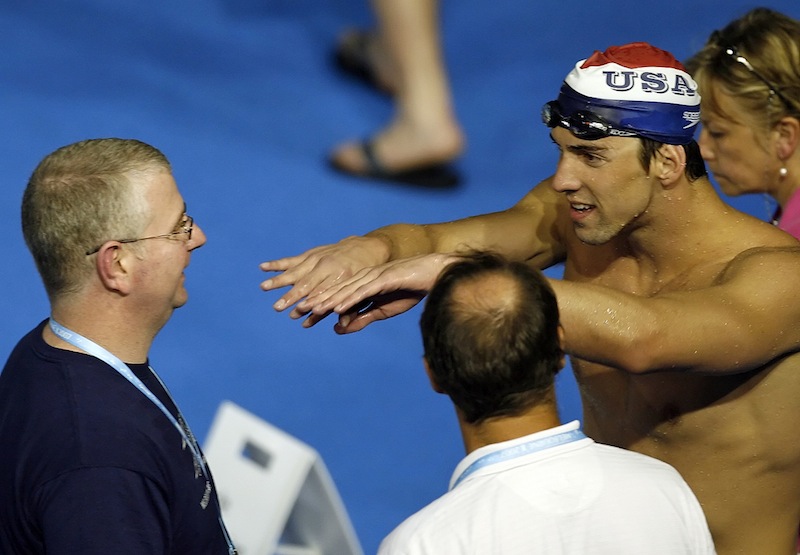
“… always a point to every meet we go to … it could be that we’re focusing on turns or other specific aspects of his performance, a particular aspect of a single stroke of a medley. It may not be obvious to others what he’s focussing on but … there’s always a point in the practice of racing at those meets. We wouldn’t be there if there wasn’t.”
Bob Bowman – Photo: Michael Phelps (R) talks to his coach Bob Bowman (L) at the Melbourne 2007 World Championships – by Patrick B. Kraemer / MAGICPBK
So why Euro short-course in December, why Doha in February? Says Dean through a broad smile: “Craig, he’s absolutely right. There is always a purpose to a race.
“I think first and foremost every race is valuable if it refines your actual Race Craft. I think nothing can quite replicate standing on the blocks hearing the referee’s whistle and having to go through your race-day and race routine. I’ve spoken to you about how I take confidence in routine, and that’s what provides you with that calm when I do step up [come the biggest of race days].”
He notes the high risk of any failure to build the foundation of the biggest race day of your life in preparation on every other day of your career dedicated to the ultimate goal: “It’s all well and good training all year and then just stepping up on the blocks in Paris and trying to do it then but actually … I go through a process every day in training, at every meet, knowing what it’s like: I’m gonna wake up in the morning and I’m prepping progression through heats, semis and finals.
“So, fine tuning your Race Craft is always valuable. We work in cycles with Dave [McNulty, head coach at the Bath University HPC]; say September to Christmas, Christmas to the Olympic trials and then Olympic trials to Paris.” McNulty had tried a long winter cycle from September to trials a few seasons back but it didn’t work out well. “Physically and mentally athletes get burnt out,” says Dean. “You need a Christmas goal to really get your head down but have more of the purpose around what you’re doing.”
He points to the “really hard, intense, high-lactate tolerance” and other challenging winter preparation that’s easier to embrace when “we know we’re doing it because we’re going to have a little bit of a rest, then we’re going to race …”, as he did in multiple events at European short-course Championships last December and will do so again in Doha this coming week before heading out to Australia for his last overseas training camp before Olympic trials.
Scott Cites Britain Team Cohesion
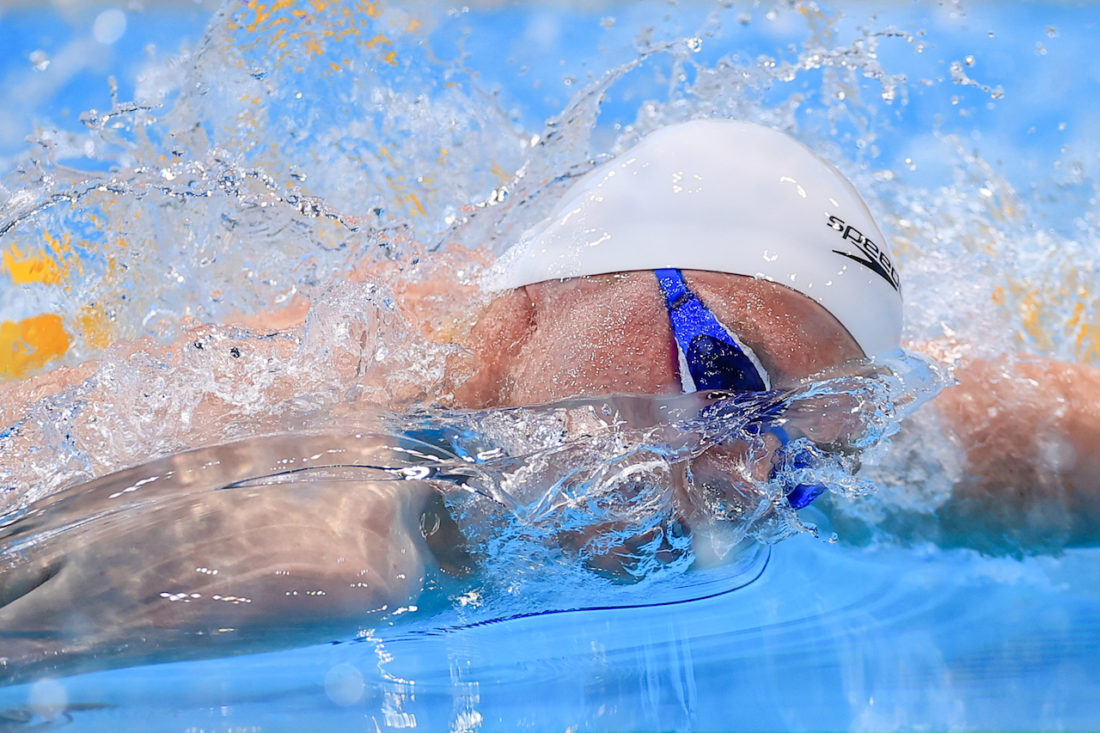
Scott nods in agreement on the Bowman question of “a point to everything” and notes “firstly, team cohesion” when it comes to the usefulness of big championship moments on the way to Paris even if they are, under prevailing circumstances, in-season meets.
Most of those at European s/c in December and Doha this week are likely to be on the Britain Olympic team, he believes, so “It’s a good chance to get stuff together right”. For Scott, that means approaching such occasions with a view to working on aspects of his performance that he knows his key rivals are strong on.
Example, Leon Marchand, the Arizona-Sun-Devils-Bowman-based French triple World champion of 2023 (both medleys and 200 ‘fly) has excellent turning skills so every wall at the European s/c championships was one Scott placed extra focus on, every race, heats, semis and finals.
The remote nature of swimming coverage on the vast majority of occasions beyond the Olympic Games and the consequent glare of time and medal on a screen often blind us to the habits on display at lesser race days but rarely (niche) or never (mainstream) reported on. The lore and storytelling and the art of painting the canvas of the sport is fading into history as coverage of swimming wanes.
A topic for another time but a few issues were raised in this three parter:
When It’s “Increasingly Difficult For Serious Journalists To Cover” Sports
When It’s “Increasingly Difficult For Serious Journalists” To Cover … Part II: Swimming
When It’s “Increasingly Difficult For Serious Journalists” To Cover Sport … Part III: Trust
Richards: A Chance To Practice Busy Britain Schedule In Prep For Paris
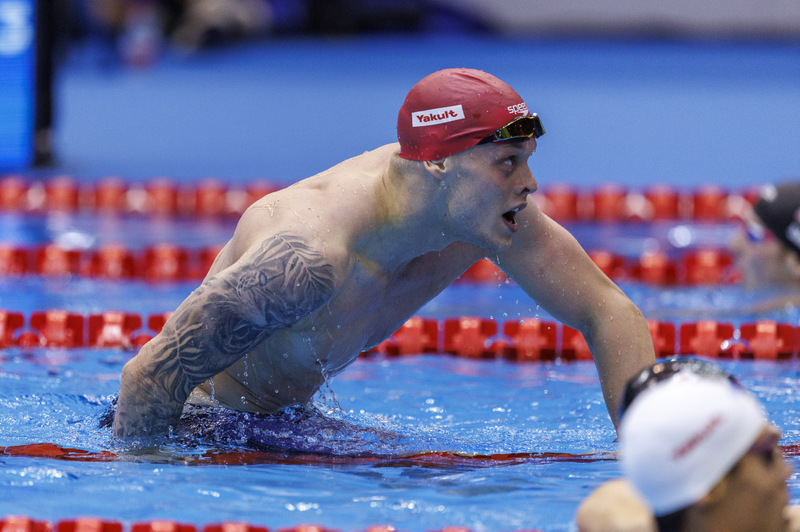
For Matt Richards, who celebrated gold in the 200m solo and 4x200m free for Britain at World titles in 2023 to end up as British swimmer of the year and a swimmer who merited a listing among the best British achievers in sport last year (but didn’t get one because merit in performance is not prioritised), a cracking end to the year at European short-course championships was, like Scott, a chance to “really fine-tune those skills around the walls”.
“We get pretty much double the number of opportunities to do that than we would long-course,” says Richards, an Olympic champion in the 4x200m at 18 in Tokyo. On top of being “as close to the best as I can be around every turn, off every wall, going into and out of all of them”, it was also about “going in to try and win some golds.” Mission accomplished.
“Another purpose [of all championship meets, including Doha] is to practice having a really busy schedule, because I had a busy schedule at Worlds [in 2023], and to plan for having that schedule in Paris, make sure that we’re getting used to that.”
The Doha 4x100m freestyle can be watched on Eurosport on Sunday or on local networks in countries that have bought rights from World Aquatics.
Owing to the circumstances of the meet and other factors, SOS will not provide comprehensive coverage of the World Championships in time-honoured way but we will be following the progress of the Brit relays and other highlights in the course of the eight days off racing before providing an overview and analysis of the events the week after next.